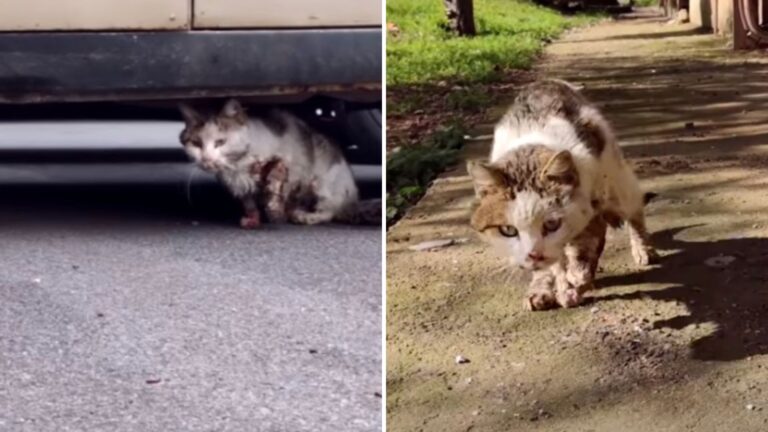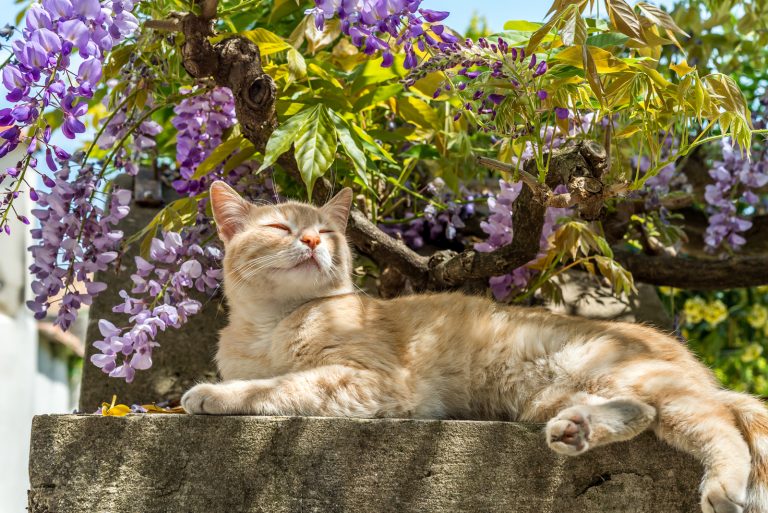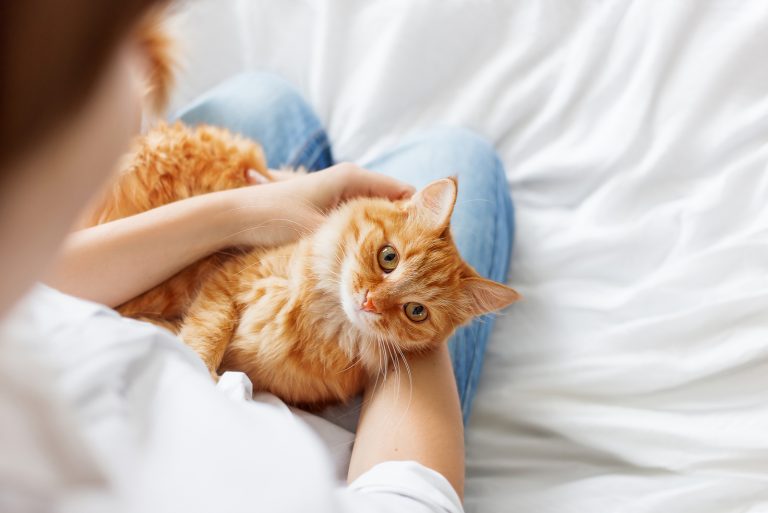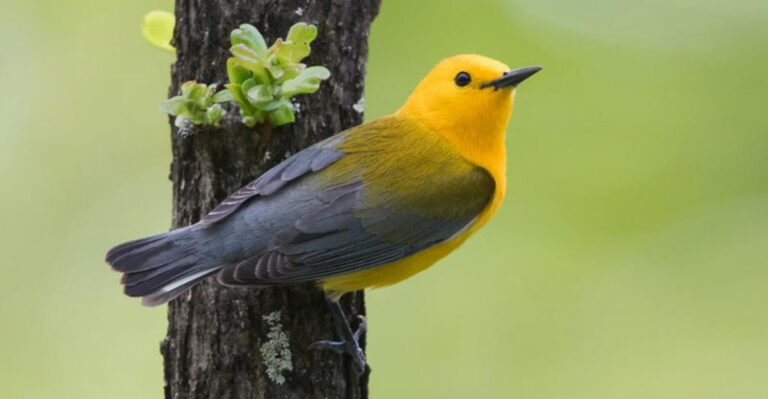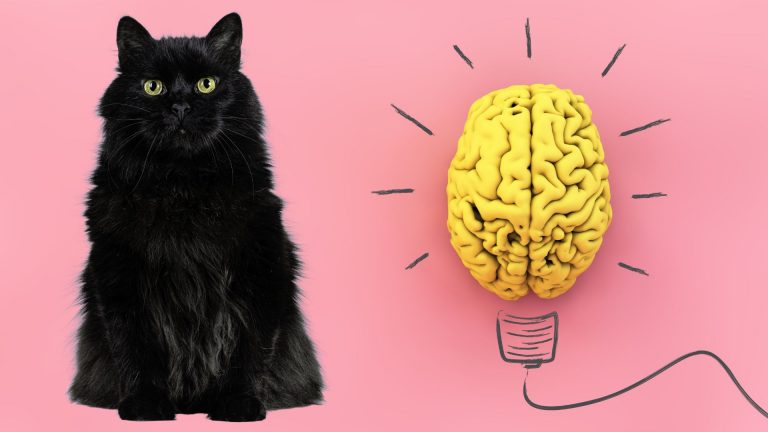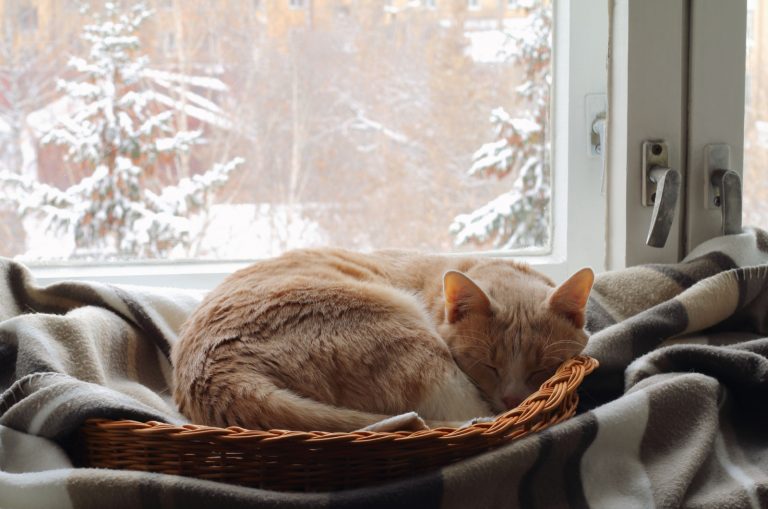It’s Funny But Why Do Cats Open Their Mouths When They Smell?
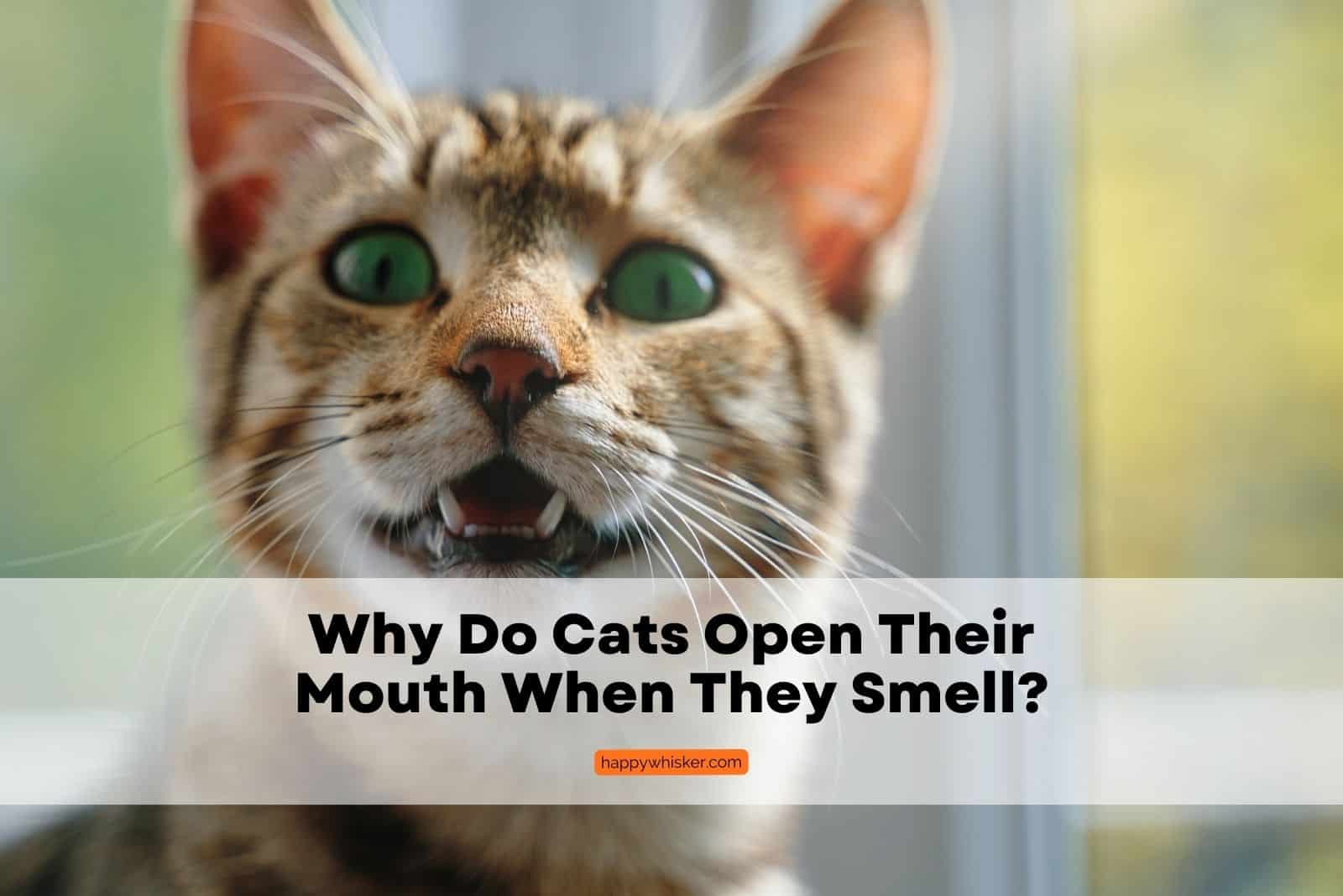
Cats are naturally extremely curious animals; they tend to roam around the house for hours. You’ve probably noticed your cat exploring everything they come across, especially if something new gets in their way.
Likewise, you’ve probably seen your furry friend sniffing and opening its mouth at some point. Why does my cat open its mouth, does something stink in the house?
I wondered the same thing when I first saw it, so let’s ask why do cats open their mouths when they smell and does it necessarily mean that something reeks?!
Why Do Cats Open Their Mouth When They Smell Around?
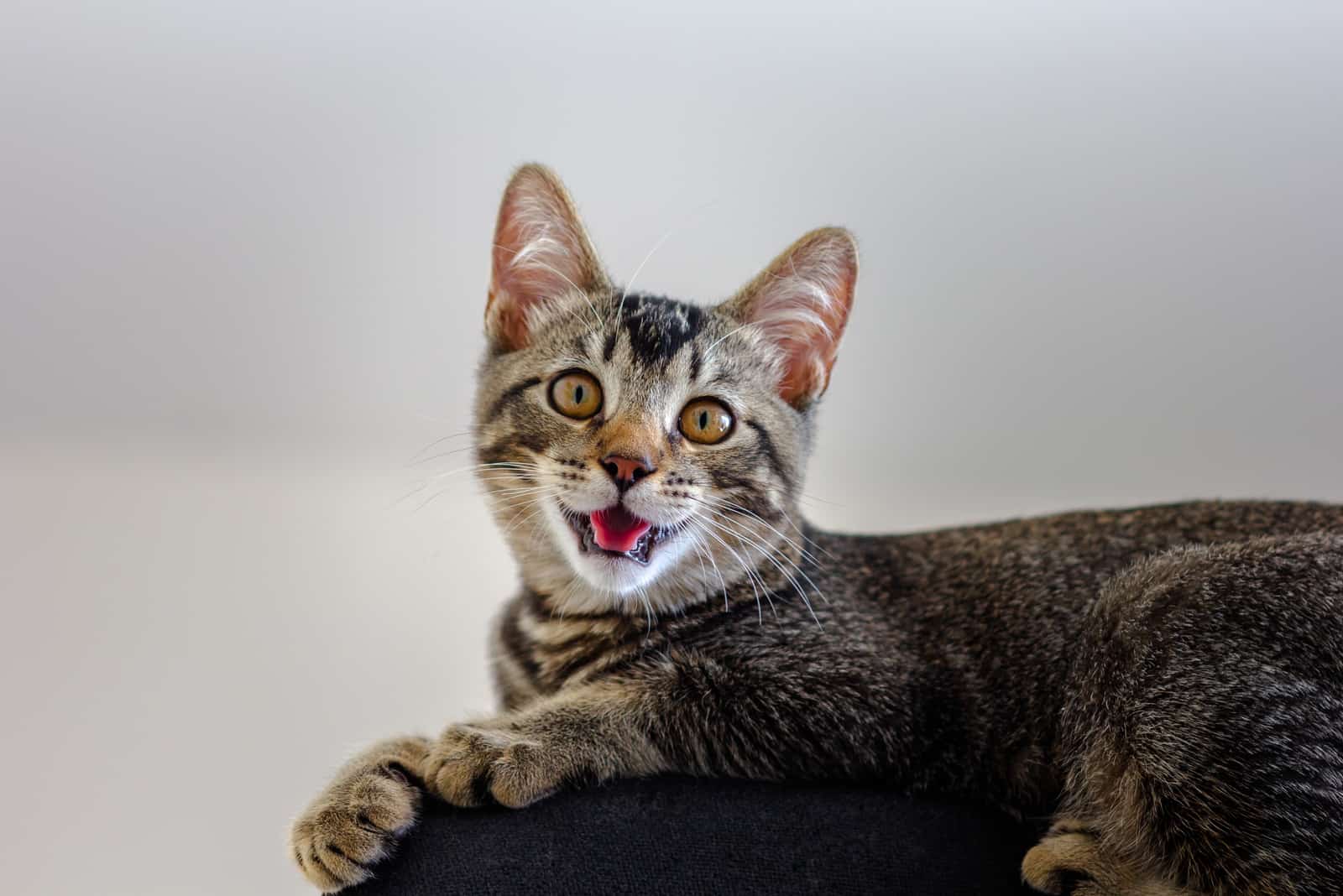
It looked funny to me, but I also wanted to know why do cats open their mouth when they smell. It looks funny, as if your cat just happened to smell a horrible scent.
I remember what was probably the first time I saw this behavior, and it wasn’t until just recently that I learnt what it is. When I first saw it, my brother and I were just kids, and we had a kitten at our grandma’s house.
It was a hot summer’s day and my brother took off his sneakers, and let’s just say his feet did not have a pleasing smell.
Our kitten came up to his feet and after just a sniff, he opened his mouth and made this ridiculous face that was, back then, the funniest thing to us. However, years later, I learned that this is something called the flehmen response.
What Is The Flehmen Response?
I’ve discussed this with my colleague Iram Sharma (DVM) so I can get a better understanding.
As Iram explains, “when cats sniff with their mouth open or open their mouth right after they smell something, it’s called the flehmen response or the flehmen reaction, and it’s completely normal.”
Cat’s vomeronasal organ, i.e. Jacobson’s organ is located on the palate just behind the cat’s upper teeth, exactly on the roof of the mouth. This organ is also referred to as the scent analyzer.
Cats can basically sense and detect different scents flowing through the air, with their mouth. This organ is also found in big cats like tigers, and lions, and also in goats, giraffes, rhinos, and so on.
The Purpose
In all these animals, Jacobson’s organ serves the same purpose: to provide important information about the animal’s surroundings. This sensory organ is small and made up of two fluid-filled sacs which are attached to the cat’s nasal cavity.
Cats open their mouths when they sniff, or rather just pull their upper lip back which then results in that unusual facial expression – this draws more air through their mouth and into the Jacobson’s organ.
This allows the organ and the cat’s olfactory system to process any interesting scent more thoroughly than the cat’s nose can. Your cat’s sense of smell is a lot stronger than yours because of the Jacobson’s organ.
Read more about it in Jacobson Organ: Cat Biology 101 – Pheromone Detection.
What Triggers It?
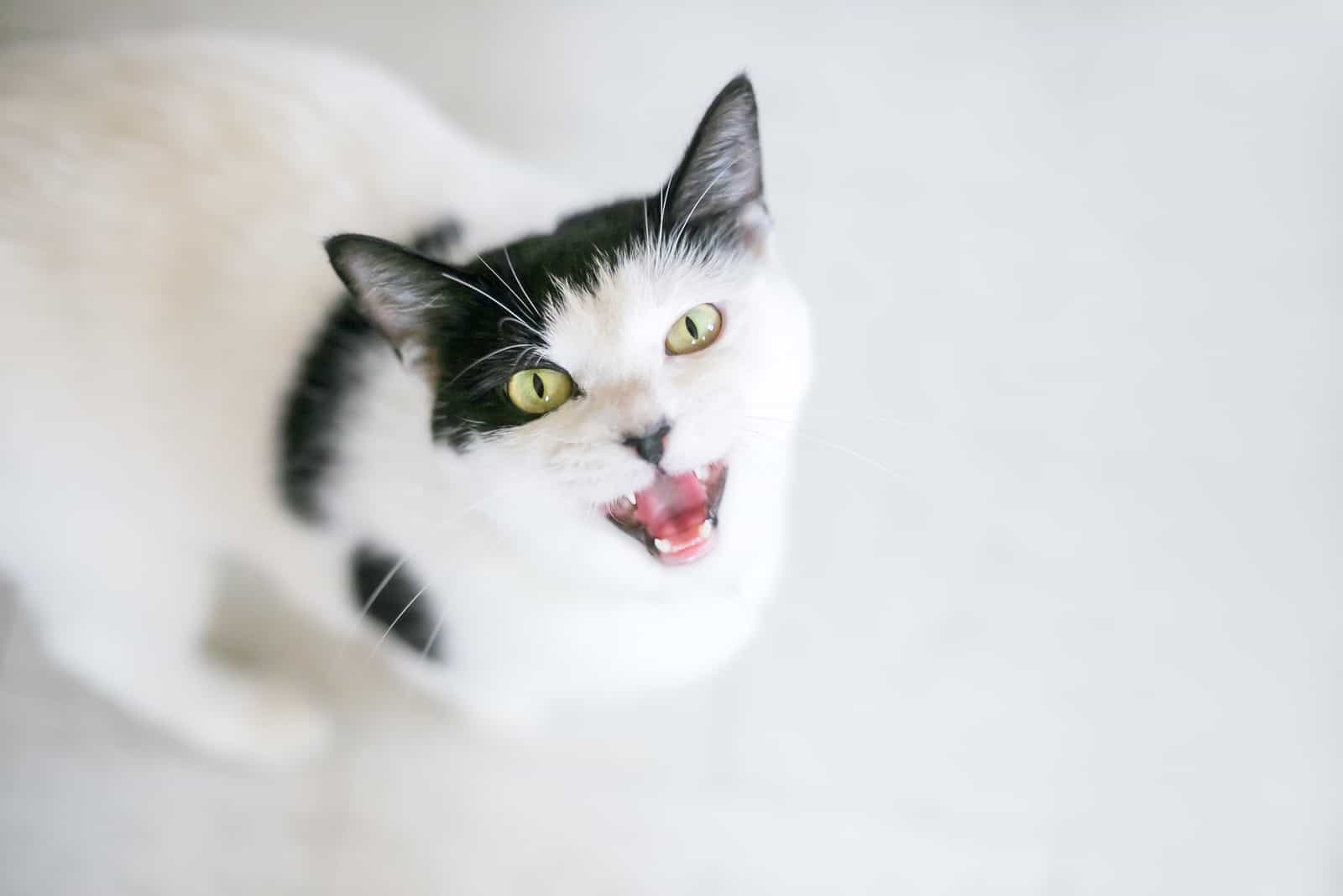
Perhaps you’ve noticed that your cat does not always make that strange sniffing face. It’s possible that it only does it for specific smells or when sniffing specific areas of your home.
Pheromones are scents that are filtered by the Jacobson’s organ. Pheromones are chemical compounds secreted by all animals, in this case cats, in order to communicate with other cats.
Cats, in particular, secrete pheromones through glands on their faces, feet, and anus, which they use to mark certain spots and leave sensory information for other felines, both familiar and unfamiliar.
Ah, Those Pheromones
Cats typically display the flehmen response when sniffing another cat’s pee or feces, which contain a lot of pheromones. Scents may stay around your house or yard, on your furniture and even on you.
Male cats will often use the flehmen response to check if there are female cats in heat nearby, whereas mother cats use it to find and keep track of their kittens. When sniffing around the house, your cat may display the response.
Cats frequently mark their territory by rubbing their faces on stuff; this is your cat’s way of assuring itself and any other feline that this location is safe. They may also scratch certain spots to release pheromones from their paws.
What About Urine Marking?
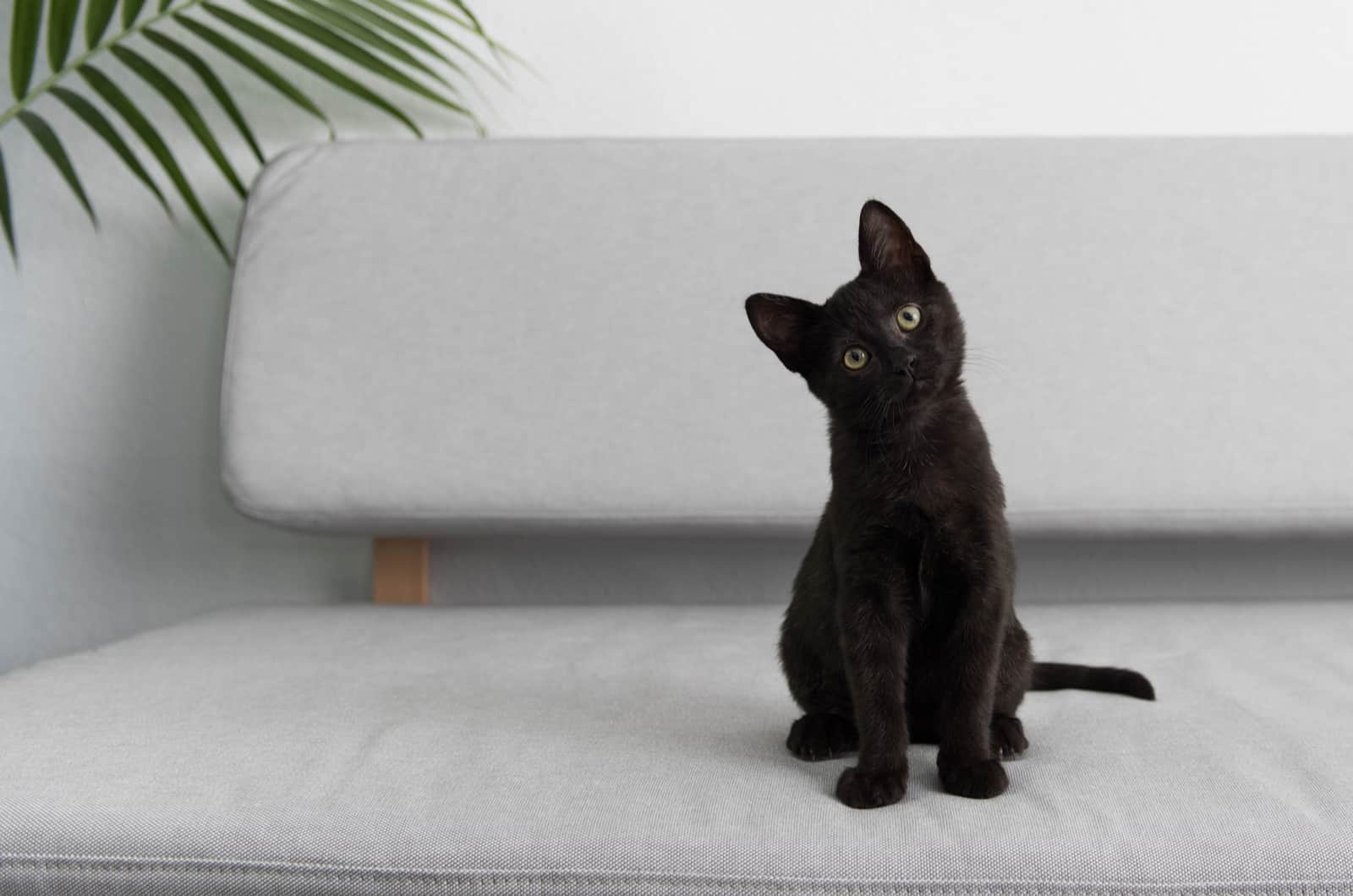
If you notice your cat frequently making this funny face (the open-mouth sniffing face) around your house, your cat could be picking up smells from other cats.
The flehmen response is a behavioral response that commonly happens when cats go out to investigate urine smells. Perhaps you let your cat out in the yard, where other wandering cats could have passed through.
Cats use urine marking to signal to rival cats that this place is theirs. It’s especially common in unneutered male cats who are searching for potential mates.
There is no need to be concerned if you notice your cat snooping around your house or outside and making that funny face, sniffing with their mouths open.
Using its keen senses, your cat is simply learning more about its environment and other felines in the area.
How Good Is Your Cat’s Smell?
A cat’s sense of smell is exceptionally good. In comparison to about five million olfactory receptors located in the human nose, a cat’s nose has about two hundred million.
When you think something smells bad in a room and you’re trying to find out what it is, your cat has probably already cracked the mystery. Your cat can easily detect whether the smell is coming from another cat, a potential predator, or your pet dog.
See also: Can Cats Breathe Through Their Mouth? Everything You Need To Know!
What Do Cats Do When They Smell Something Bad?
When people get a slight hint of something really stinky, they may make a face that looks like the cat’s flehmen response, but in cats, it has nothing to do with whether the smell is pleasant or not. What matters to a cat is how appealing the smell is.
When your cat makes that funny face after sniffing something interesting to them, they’re primarily trying to analyze the scent to discern as much olfactory information as possible.
A cat will simply leave if something smells bad to them. Remember that things that stink to us (e.g. garbage, other cat’s pee) may be totally interesting to your cat.
On the other hand, there’s a number of scents that most people find appealing (e.g. oranges, cinnamon) are repulsive to cats.
4 Other Reasons Cats Open Their Mouth When They Smell
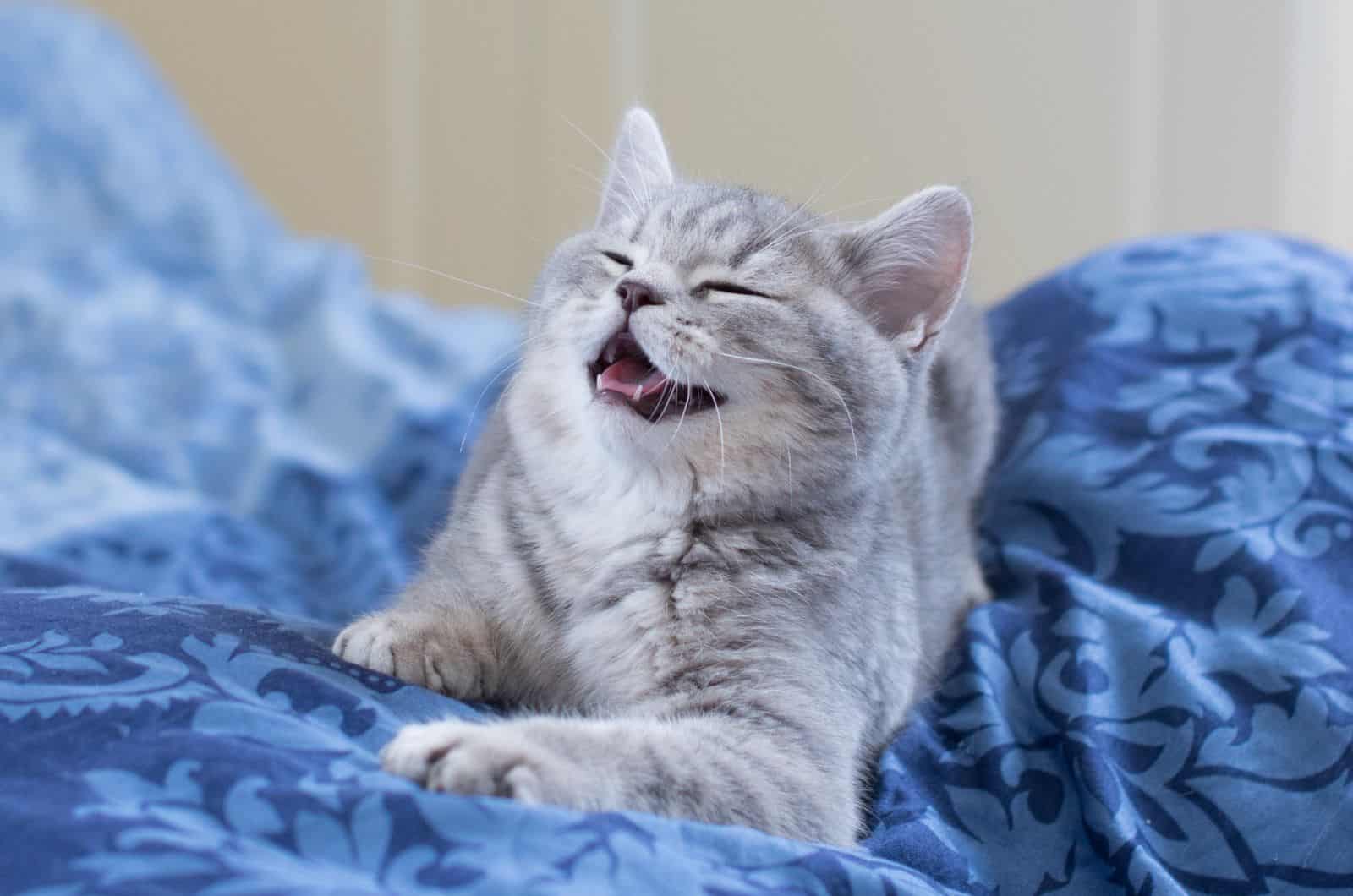
Other than the flehmen response, your cat might be opening their mouth after they’ve sniffed something, or open-mouth breathing, due to other reasons as well. Here are the most common four causes of this unusual type of cat behavior.
1. Your Cat Is Stressed Or Too Hot
If your cat is anxious or stressed, they might open their mouth while smelling because they want to relax or calm themselves due to rapid breathing.
Maybe your cat got scared or was surprised and wants to calm itself down by breathing through its mouth and nose. Your cat’s mouth may also be open if they are panting. If this is the case, your cat is probably trying to cool down and lower its body temperature.
I witness this every summer with my cats, and sometimes even during winter if my house gets too warm.
This is why you should always keep your home at a normal temperature, and always keep an eye on your cats so that they’re neither too hot nor too cold.
2. Your Cat’s Been Active
If your cat’s been playing for some time, exploring the great outdoors, or it has been active in any way, it might breathe with its mouth partially open, since breathing solely through the nose is sometimes not enough.
This way your cat can relax more easily, plus it will also increase the amount of oxygen the cat receives. All of this helps your cat to calm down and cool down.
However, most cats are highly active and this doesn’t happen. This is more common in overweight cats, especially those that aren’t used to being active.
3. Your Cat Has Got The Flu
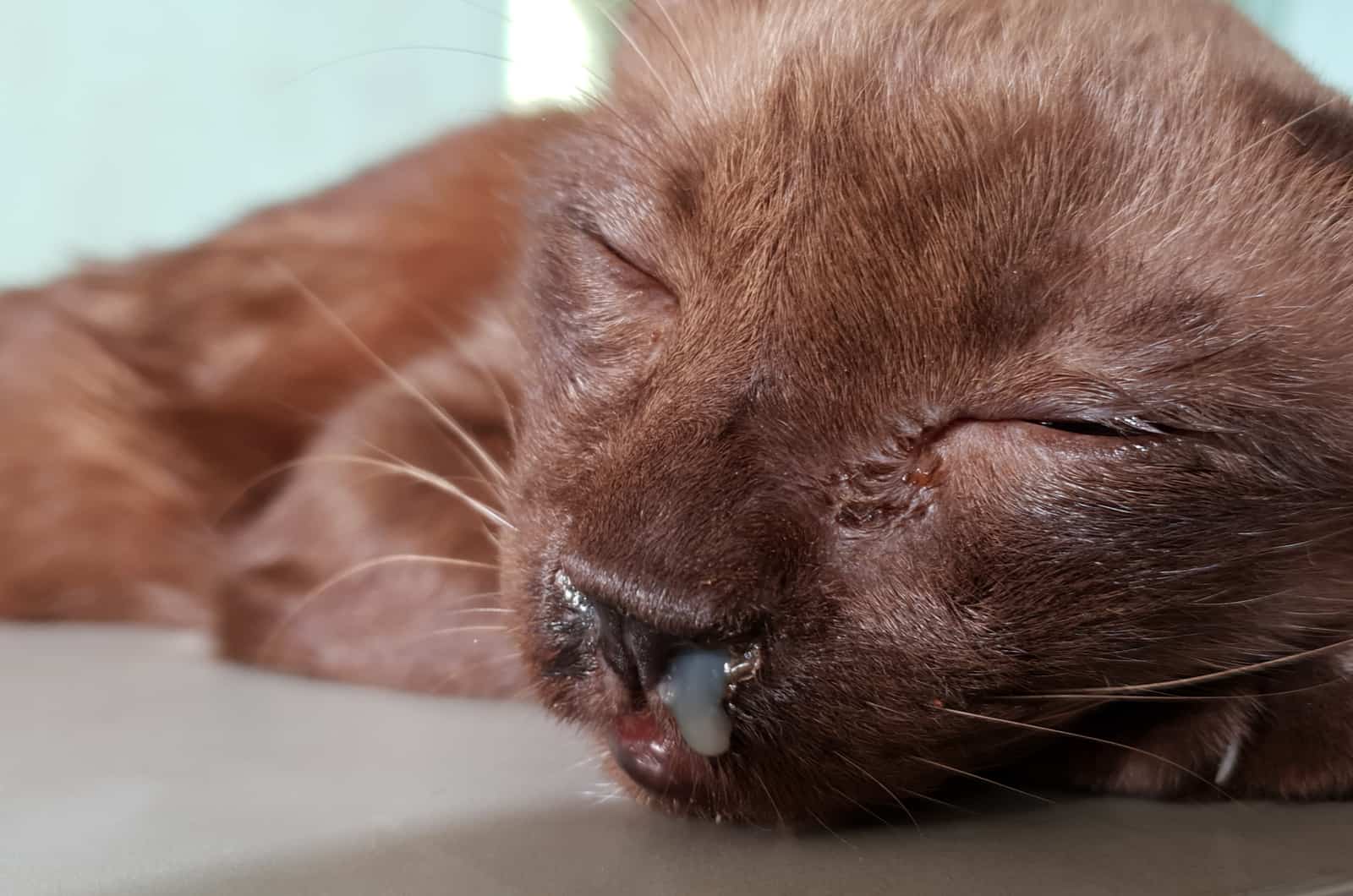
Cat flu is a bit more serious if it has already gotten to the point where your cat breathes through its mouth. Flu affects the cat’s respiratory system, most likely causing shortness of breath which is why your cat needs to keep its mouth open.
Other symptoms of cat flu which can help you discern it from other reasons from this list include primarily drooling (because they need to keep their mouths open due to blocked nasal cavity), then nasal discharge, lethargy, coughing, loss of appetite, etc.
Your cat will therefore open its mouth in order to try to inhale more oxygen. Bring your cat to the vet for a specific diagnosis and treatment option.
4. And Finally, The Blep
Perhaps you’ve seen memes called the blep, or you’ve seen your own cat making the same face. It is incredibly cute to most cat parents, but there is more to it than just cuteness.
It is also often mistaken for the flehmen response I’ve discussed at the beginning, but the blep is very different.
The blep also allows your cat to investigate its environment because cats do it to collect the traveling pheromones on their tongue, which they then transport to the roof of their mouths.
Another reason cats do the blep, is to check whether there is a cat in heat nearby. Cats are very much relaxed and focused in this pose, so relaxed that they often forget to put their tongue back in which lets us enjoy and chuckle at the adorable sight.
I’ve noticed my cat Mikey even sleeping in this position; many veterinary experts say this might be due to their dreams. Your cat might be dreaming about something that will make them stick their tongues out in search of scents.
Male cats are more prone to this behavior, especially when they’re looking for potential females in heat.
However, if you notice that your cat regularly does this, it’s best to talk to your vet. Just to make sure there isn’t any health issue to be concerned about and that your cat’s teeth and jaws are ok.
You might also be interested in: Why Do Cats Stick Their Tongues Out? 18 Interesting Reasons
Final Words
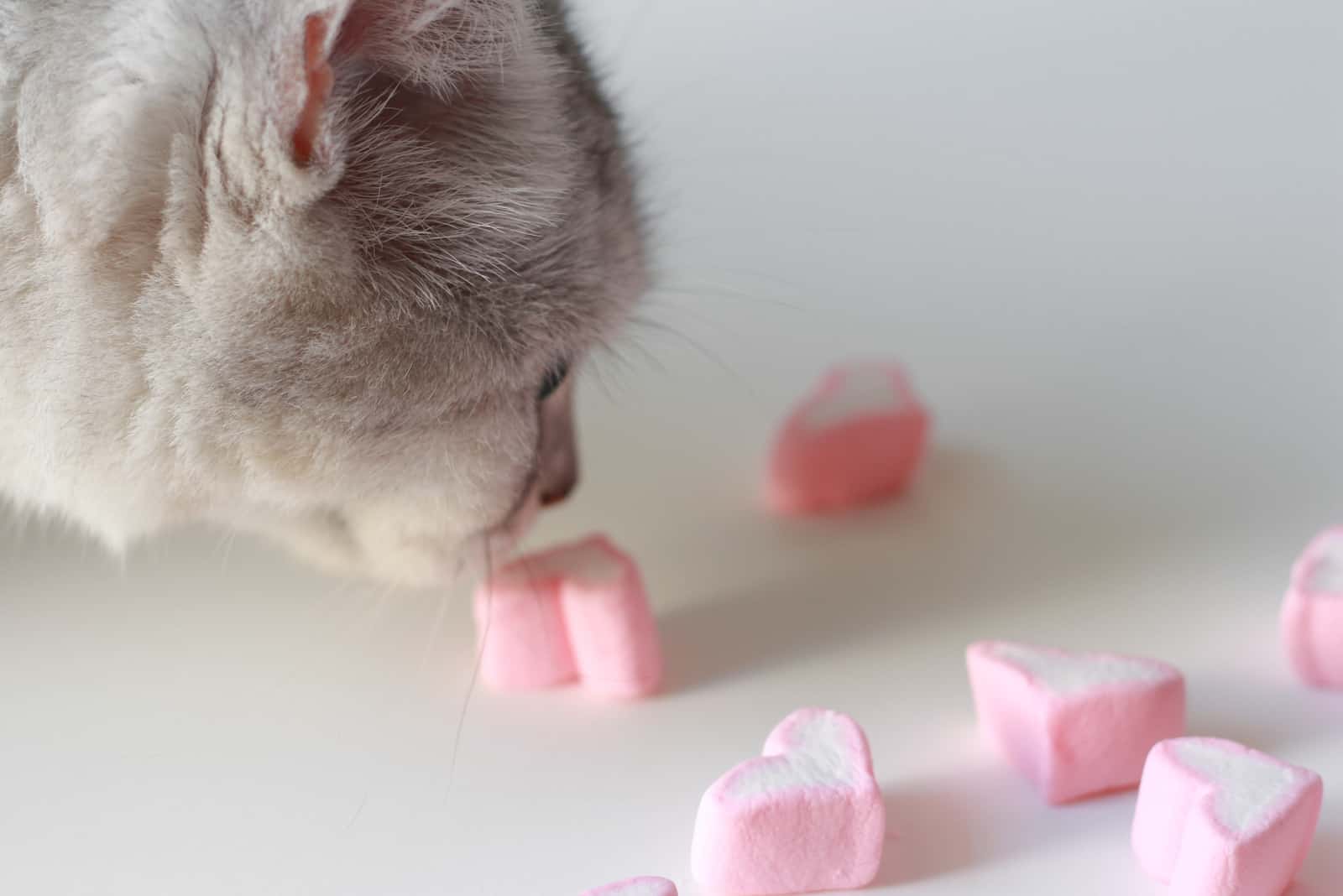
Even though a lot of cat owners thought that when their cats open their mouths while sniffing, it was their stinky face, the answer to why do cats open their mouths when they smell is a bit different.
Your feline friend is most likely exhibiting the flehmen response, which is normal, and all domestic and wild cat breeds do it. This is their way of detecting and analyzing different scents.
Cats are not the only animals that do it; some other animals like giraffes, hippos, bison, and so on, also do it.
Your cat can also be stressed or too hot, it might have the flu, or it’s just finished some activity that requires it to inhale through both the nose and the mouth in order to calm them.
All in all, if you’ve seen your cat snooping around with their mouth open, or if it opens its mouth right after smelling something, it’s usually normal and nothing to be worried about.
Note: if your cat continually does this or keeps its mouth open for a longer period of time, have it vet-checked just to be sure.

